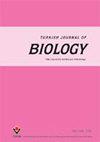塞来昔布和L-NAME对MCF-7 CD44+/CD24-/低亚群细胞凋亡和细胞周期的影响
IF 0.9
4区 生物学
Q3 BIOLOGY
引用次数: 5
摘要
最近的研究表明,癌症干细胞(CSCs)在治疗失败中起着关键作用,导致癌症复发。在此,我们研究了L-NAME(一种iNOS抑制剂)和塞来昔布(一种选择性COX-2抑制剂)对CSC样细胞(CSC-LCs)及其亲代细胞的影响。对来源于MCF-7细胞系的乳腺CSC LC进行分类,并以CD44+/CD24-/低表型进行表征。分离后,表达CD44+/CD24-/低生物标志物的亚群的百分比从0.96%显著增加到28.6%。L-NAME和塞来昔布的使用显示出对MCF-7和CSC-LCs的抗增殖活性。尽管塞来昔布增强了细胞凋亡,但CSC-LC群体比亲代细胞更具耐药性。此外,L-NAME在诱导细胞凋亡方面的效果较差,这表明其参与了不同的细胞死亡机制。L-NAME导致CSC-LCs的细胞周期停滞在S期,而塞来昔布诱导CSC-LCs及其亲代细胞的G0/G1停滞。免疫细胞化学结果表明,L-NAME在MCF-7和CSC-LCs中具有类似的减弱iNOS表达的效力;然而,塞来昔布降低了MCF-7细胞中COX-2的表达。结果显示NOS和COX-2在维持CD44+/CD24-/低乳腺CSC-LCs中的关键作用,并表明L-NAME和塞来昔布在联合治疗中可能具有临床意义。本文章由计算机程序翻译,如有差异,请以英文原文为准。
Effects of celecoxib and L-NAME on apoptosis and cell cycle ofMCF-7 CD44+/CD24-/low subpopulation
Recent studies have reported that cancer stem cells (CSCs) play a pivotal role in treatment failure, causing cancer recurrence. Here, we investigated the effects of L-NAME (an iNOS inhibitor) and celecoxib (a selective COX-2 inhibitor) on CSC-like cells (CSC-LCs) and their parental cells. Breast CSC-LCs derived from the MCF-7 cell line were sorted and characterized with the CD44+/CD24-/low phenotype. After isolation, the percentage of the subpopulation expressing CD44+/CD24-/low biomarkers increased considerably from 0.96% to 28.6%. Use of L-NAME and celecoxib showed antiproliferative activity towards both MCF-7 and CSC-LCs. Although celecoxib enhanced apoptotic cell death, the CSC-LC population was more resistant than parental cells. Moreover, L-NAME was less effective at inducing apoptosis, suggesting an involvement of different mechanisms of cell death. L-NAME caused cell cycle arrest in the S-phase in CSC-LCs, while celecoxib induced G0/G1 arrest in CSC-LCs and their parental cells. Immunocytochemistry results demonstrated that L-NAME had a similar potency to attenuate iNOS expression in MCF-7 and CSC-LCs; however, celecoxib reduced COX-2 expression in MCF-7 cells. The results show the crucial role of NOS and COX-2 in the maintenance of CD44+/CD24-/low breast CSC-LCs and suggest that L-NAME and celecoxib could have clinical implication in combination therapy.
求助全文
通过发布文献求助,成功后即可免费获取论文全文。
去求助
来源期刊

Turkish Journal of Biology
BIOLOGY-
CiteScore
4.60
自引率
0.00%
发文量
20
审稿时长
6-12 weeks
期刊介绍:
The Turkish Journal of Biology is published electronically 6 times a year by the Scientific and Technological
Research Council of Turkey (TÜBİTAK) and accepts English-language manuscripts concerning all kinds of biological
processes including biochemistry and biosynthesis, physiology and metabolism, molecular genetics, molecular biology,
genomics, proteomics, molecular farming, biotechnology/genetic transformation, nanobiotechnology, bioinformatics
and systems biology, cell and developmental biology, stem cell biology, and reproductive biology. Contribution is open
to researchers of all nationalities.
 求助内容:
求助内容: 应助结果提醒方式:
应助结果提醒方式:


